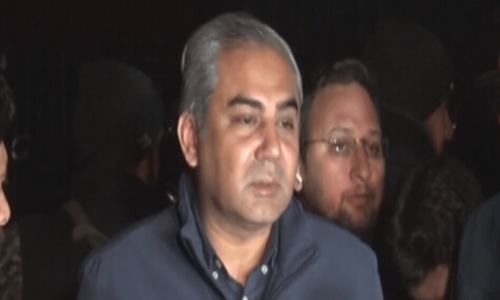KARACHI: The Sindh High Court on Thursday directed the provincial authorities and others to file their replies on a second petition against the provincial government’s decision to send Inspector General of Police A. D. Khowaja on “forced leave”.
The fresh petition was filed by Shehri-Citizens for a Better Environment — a non-governmental organisation, Sheema Kermani, Tasneem Ahmed Siddiqui, Arif Hasan and Naeem Sadiq.
Headed by Chief Justice Sajjad Ali Shah, a two-judge bench also ordered the clubbing of the petition with an identical one earlier filed by rights activist Karamat Ali, former Citizens-Police Liaison Committee (CPLC) chief Nazim F. Haji, Aqeela Ismail, singer Shahzad Roy, the Pakistan Institute of Labour Education and Research, the Urban Resource Centre and the Orangi Pilot Project.
Advocate Faisal Siddiqui represented the petitioners in both the petitions, while two of the official respondents — the home secretary and IGP Khowaja — engaged advocates Farooq H. Naek and Shahab Usto to represent them in court. Standing counsel Saeed A. Memon represented the interior and law ministries, while Advocate General Zamir Ghumro appeared for the chief secretary. The bench will take up the matter on Feb 15.
The petitioners moved the SHC challenging the provincial government’s sending IGP Khowaja on “forced leave” and his possible removal. They also questioned the provincial authority over the repeal of the Police Order, 2002.
The interior secretary, the provincial home and law secretaries, the director general of Sindh Rangers, acting IGP Mushtaq Mahar and Mr Khowaja were cited as respondents.
Mr Khowaja, who was appointed IGP on March 12, was allegedly sent on forced leave by the provincial government.
The petitioners submitted that the Supreme Court had in its judgement passed in the Watan Party case, known as Karachi law and order suo motu case, ordered the federal and provincial governments to take steps for depoliticising the police force in Sindh. They stated that the provincial government had appointed A.D. Khowaja as IGP on March 12 this year after his predecessor, Ghulam Hyder Jamali, was removed from the post.
The petitioners submitted that IG Khowaja had ensured recruitment of 20,000 policemen on merit through the National Testing Service and representatives of the army and the CPLC were also on board during the recruitment process. They added that Mr Khowaja had also brought improvement in other matters in the police department, including increasing the compensation amount for the families of fallen policemen from Rs2 million to Rs5m and since he assumed office the police made several breakthroughs in high-profile cases.
It was submitted in the petition that Mr Khowaja was sent on “forced leave” because the provincial authorities were against the merit-based appointments made by him in the police department as well as transfers of those police officers who were working under the direct influence of politicians.
The petitioners stated that this act of the provincial government was against several provisions of the Constitution as well as the Police Rules.
Published in Dawn, January 13th, 2017












































